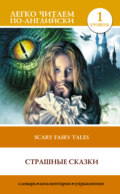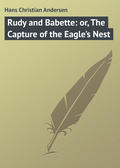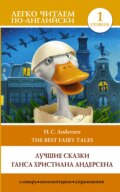
Ганс Христиан Андерсен
The Sand-Hills of Jutland
Children's Prattle
At the merchant's house there was a large party of children – rich people's children and great people's children. The merchant was a man of good standing in society, and a learned man. He had taken, in his youth, a college examination. He had been kept to his studies by his worthy father, who had not gone very deep into learning himself, but was honest and active. He had made money, and the merchant had increased the fortune left to him. He had intellect, and heart too; but less was said of these good qualities than of his money.
There visited at his house several distinguished persons, both people of birth, as it is called, and people of talents, as it is called – people who came under both of these heads, and people who came under neither of these heads. The meeting now in question was a children's party, where there was childish talk; and children generally speak like parrots.
There was one little girl so excessively proud. She had been flattered into her foolish pride by the servants, not by her parents – they were too sensible to have done that. Her father was Kammerjunker6 and she thought this was monstrously grand.
"I am a court child," she said.
She might as well have been a cellar child, as far as she was herself concerned; and she informed the other children that she was "born" (well born, she meant); that when people were not "born," they could never be anybody; and that, however much they might read, however clever and industrious they might be, if they were not "born" they could never become great.
"And those whose names end in 'sen,'" she continued, "are all low people, and can never be of any consequence in the world. Ladies and gentlemen would put their hands on their sides, and keep them at a distance, these 'sen – sens!'" And she threw herself into the attitude she had described, and stuck her pretty little arms akimbo, to show how people of her grade would carry themselves in the presence of such common creatures. She really looked very pretty.
But the merchant's little daughter became extremely angry. Her father was called "Madsen," and that name, she knew, ended in "sen;" so she said, as proudly as she could, —
"But my father can buy hundreds of rix dollars' worth of sugar-plums, and think nothing of it. Can your father do that?"
"That's all very well," said the little daughter of a popular journalist; "but my father can put both of your fathers and all 'fathers' into the newspaper. Every one is afraid of him, my mother says; for it is my father who rules everything through the newspaper." And the little girl tossed her head and strutted about as if she thought herself a princess.
But on the outside of the half-open door stood a poor little boy peeping in. It was, of course, out of the question that so poor a child should enter the drawing-room; but he had been turning the spit for the cook, and he had obtained permission to look in behind the door at the splendidly dressed children who were amusing themselves, and that was a treat to him.
He would have liked to have been one of them, he thought; but at that moment he heard what had been said, and it was enough to make him very sad. Not one shilling had his parents at home to spare. They were not able to set up a newspaper, to say nothing of writing for one. And the worse was yet to come; for his father's name, and of course also his own name, certainly ended in "sen." He, therefore, could never become anybody in this world. This was very disheartening. Though he felt assured that he was born, it was impossible to think otherwise.
This was what passed that evening.
Several years had elapsed, and during their course the children had grown up to be men and women.
There stood in the town a handsome house, which was filled with magnificent objects of art. Every one went to see it. Even people who lived at a distance came to town to see it. Which prodigy, among the children we have spoken of, could call that edifice his or hers? It is easy to tell that. No; it is not so easy, after all. That house belonged to the poor little boy, who became somebody, although his name did end in "sen." – Thorwaldsen!
And the three other children – the children of high birth, money, and literary arrogance? Well; there is nothing to be said about them. They are all alike. They grew up to be all very respectable, comfortable, and commonplace. They were well-meaning people. What they had formerly said and thought was only – children's prattle.
A Row of Pearls
I
The railroad in Denmark extends no farther as yet than from Copenhagen to Korsör. It is a row of pearls. Europe has a wealth of these. Its most costly pearls are named Paris, London, Vienna, Naples; though many a one does not point out these great cities as his most beautiful pearl, but, on the contrary, names some small, by no means remarkable town, for it is his home – the home where those he loves reside. Nay, sometimes it is but a country-seat – a small cottage hidden among green hedges – a mere spot that he hastens towards, while the railway train rushes on.
How many pearls are there upon the line from Copenhagen to Korsör? We will say six. Most people must remark these. Old remembrances and poetry itself bestow a radiance on these pearls, so that they shine in on our thoughts.
Near the rising ground where the palace of Frederick VI. stands – the home of Ochlenschläger's childhood – shines, under the lee of Sondermarken's woody ground, one of these pearls. It is called the "Cottage of Philemon and Baucis;" that is to say, the home of two loving old people. Here dwelt Rahbek and his wife Camma; here, under their hospitable roof, were collected from the busy Copenhagen all the superior intellects of their day; here was the home of genius; and now say not, "Ah, how changed!" No; it is still the spirits' home – a hothouse for sickly plants. Buds that are not strong enough to expand into flowers, preserve, though hidden, all the germs of a luxuriant tree. Here the sun of mind shines in on a home of stagnant spirits, reviving and cheering it. The world around beams through the eyes into the soul's unfathomable depths. The Idiot's Home, surrounded by the love and kindness of human beings, is a holy place – a hothouse for those sickly plants that shall in future be transplanted to bloom in the garden of paradise. The weakest in the world are now gathered here, where once the greatest and the wisest met, exchanged thoughts, and were lifted upwards. Their memories will ever be associated with the "Cottage of Philemon and Baucis."
The burial-place of kings by Hroar's spring – the ancient Roeskilde – lies before us. The cathedral's slender spires tower over the low town, and are reflected on the surface of the fiord. One grave alone shall we seek here; that shall not be the tomb of the mighty Margrethe – the union queen. No; within the churchyard, near whose white walls we have so closely flown, is the grave: a humble stone is laid over it. Here reposes the great organist – the reviver of the old Danish romances. With the melodies we can recall the words, —
"The clear waves rolled,"
and
"There dwelt a king in Leiré."7
Roeskilde! thou burial-place of kings, in thy pearl we shall see the lonely grave on whose stone is chiselled a lyre and the name – Weyse.
Now come we to Sigersted, near Ringsted. The river is shallow – the yellow corn waves where Hagbarth's boat was moored, not far from Signé's maiden bower. Who does not know the tradition about Hagbarth8 and Signelil, and their passionate love – that Hagbarth was hanged in the galley, while Signelil's tower stood in flames?
"Beautiful Sorö, encircled by woods!" thy tranquil, cloistered town peeps forth from among thy moss-covered trees; the keen bright eyes of youth gaze from the academy, over the lake, to the busy highway, where the locomotive's dragon snorts, while it is flying through the wood. Sorö, thou poet's pearl, that hast in thy custody the honoured dust of Holberg! like a majestic white swan by the deep lake stands thy far-famed seat of learning. We fix our eyes on it, and then they wander in search of the simple star-flower in the wooded ground – a small house. Pious hymns are chanted there, that echo over the length and breadth of the land; words are uttered there to which the very rustics listen, and hear of Denmark's bygone ages. As the greenwood and the birds' songs belong to each other, so are associated the names of Sorö and Ingemann.
To Slagelsé! What is the pearl that dazzles us here? The monastery of Antoorskov has vanished, even the last solitary remaining wing, though one old relic still exists – renovated and renovated again – a wooden cross upon the heights above, where, in legendary lore, it is said that Holy Anders, the warrior priest, woke up, borne thither in one night from Jerusalem!
Korsör – there wert thou9 born, who gave us
"Mirth with melancholy mingled,
In stories of 'Knud Sjællandsfar.'"
Thou master of language and of wit! the old decaying ramparts of the deserted fortification are now the last visible mementos of thy childhood's home. When the sun is sinking, their shadows fall upon the spot where stood the house in which thine eyes first opened on the light. From these ramparts, looking towards Sprogös hills, thou sawest, when thou "wert little,"
"The moon behind the island sink;"
and sang it in undying verse, as afterwards thou didst sing the mountains of Switzerland; thou, who didst wander through the vast labyrinth of the world, and found that
"Nowhere do the roses seem so red —
Ah! nowhere else the thorn so small appears,
And nowhere makes the down so soft a bed,
As that where innocence reposed in bygone years!"
Capricious, charming warbler! We will weave a wreath of woodbine. We will cast it into the waves, and they will bear it to Kielerfiord, upon whose coast thine ashes repose. It will bring a greeting from a younger race, a greeting from thy native town, Korsör, where ends the row of pearls.
II
"It is, truly enough, a row of pearls from Copenhagen to Korsör," said my grandmother, who had heard read aloud what we have just been reading. "It is a row of pearls for me, and it was that more than forty years ago," she added. "We had no steam engines then. It took us days to make a journey which you can make now in a few hours. For instance, in 1815, I was then one-and-twenty years old. That is a pleasant age. Even up in the thirties it is also a pleasant age. In my young days it was much rarer than now to go to Copenhagen, the city of all cities, as we thought it. After twenty years' absence from it, my parents determined to visit it once more, and I was to accompany them. The journey had been projected and talked of for years. At length it was positively to be accomplished. I fancied that I was beginning quite a new life, and certainly, in one way, a new life did begin for me.
"After a great deal of packing and preparations we were ready to start. Then what numbers of our neighbours came to bid us good-by! It was a very long journey we had before us. Shortly before mid-day we drove out of Odense in my father's Holstern wagon – a roomy carriage. Our acquaintances bowed to us from the windows of almost every house until we were outside of St. Jörgen's Port. The weather was delightful, the birds were singing, all was pleasure. We forgot that it was a long way and a rough road to Nyborg. We reached that place towards evening. The post did not arrive till midnight, and until it came the packet could not sail. At length we went on board. Before us lay the wide waters, as far as the eye could see, and it was a dead calm. We lay down in our clothes and slept. When I awoke in the morning, and went on deck, nothing could be seen on either side of us, there was such a thick fog. I heard the cocks crowing, and I knew the sun must have risen. Bells were ringing: where could they be? The mist cleared away, and we found we were lying a little way from Nyborg. As the day advanced we had a little wind: it stiffened, and we got on faster. At last we were so fortunate, at a little after eleven o'clock at night, as to reach Korsör. We had taken twenty-two hours to go sixteen miles.
"Glad we were to land; but it was extremely dark, and the lanterns gave very little light. However, all was wonderful to me, who had never been in any other town but Odense.
"'Here Baggesen was born,' said my father, 'and here Birckner lived.'
"It seemed to me that the old town, with its small houses, became at once larger and more important. We were also rejoiced to have the firm earth under us once more; but I could not sleep that night, I was so excited thinking over all I had seen and encountered since I had left home two days before.
"Next morning we rose early. We had before us a bad road, with frightful hills and many valleys, till we reached Slagelsé; and beyond it, on the other side, it was but little better; therefore we were anxious to get to Krebsehuset, that we might early next day go on to Sorö, and visit Möllers Emil, as we called him. He was your grandfather, my worthy husband, the dean. He was then a student at Sorö, and very busy about his second examination.
"Well, we arrived about noon at Krebsehuset. It was a gay little town then, and had the best inn on the road, and the prettiest country round it: you must all admit that it is pretty still. She was a very active landlady, Madame Plambek, and everything in her house was as clean as a new pin. There hung up on her wall a letter from Baggesen to her. It was framed, and had a glass over it; it was a very interesting object to look at, and to me it was quite a curiosity. We then went into Sorö, and found Emil there. You may believe he was very glad to see us, and we were very glad to see him – he was so good and so attentive. We went with him to see the church, with Absolon's grave and Holberg's coffin. We saw the old monkish inscriptions, and we sailed over the lake to Parnasset – the sweetest evening I remember. I recollect well that I thought, if one could write poetry anywhere in the world, it would be at Sorö, amidst those charming, peaceful scenes, where nature reigns in all her beauty. Afterwards we visited by moonlight the 'Philosopher's Walk,' as it was called – the beautiful, lonely path by the lake and the moor that leads towards the highway to Krebsehuset. Emil remained to supper with us, and my father and mother thought he had become very clever and very good-looking. He promised us that he would be in Copenhagen within a few days, and would join us there: it was then Whitsuntide. We were going to stay with his family. These hours at Sorö and Krebsehuset, may they not be deemed the most beautiful pearls of my life?
"The next morning we commenced our journey at a very early hour, for we had a long way to go to reach Roeskilde, and we were anxious to get there in time to see the church. In the evening my father wished to visit an old friend, so we stopped at Roeskilde that night, and the next day we arrived at Copenhagen. It took us three days to go from Korsör to Copenhagen; now the journey is made in three hours. The pearls have not become more valuable – that they could not be – but they are strung together in a new and wonderful manner. I remained three weeks with my parents in Copenhagen, and Emil was with us there for a fortnight. When we returned to Fyen, he accompanied us as far as Korsör. There, before parting, we were betrothed; so you can well believe that I call from Copenhagen to Korsör a row of pearls.
"Afterwards, when Emil and I were married, we often spoke of the journey to Copenhagen, and of undertaking it once more. But then came first your mother, then she had brothers and sisters, and there was a great deal to do; so the journey was put off. And when your grandfather got preferment, and was made dean, all was thankfulness and joy; but we never got to Copenhagen. No, never have I set foot in it again, as often as we thought of it and projected going. Now I am too old, and I could not stand travelling by a railroad; but I am very glad that there are railroads – they are a blessing to many. You can come more speedily to me; and Odense is now not farther from Copenhagen than in my young days it was from Nyborg. You could now go in almost the same space of time to Italy as it took us to travel to Copenhagen. Yes, that is something!
"Nevertheless, I shall stay in one place, and let others travel and come to me if they please. But you should not laugh at me for keeping so quiet; I have a greater journey before me than any by the railroad. When it shall please our Lord, I have to travel up to your grandfather; and when you have finished your appointed time on earth, and enjoyed the blessings bestowed here by the Almighty, then I trust that you will ascend to us; and if we then revert to our earthly days, believe me, children, I shall say then as now, 'From Copenhagen to Korsör is indeed a row of pearls.'"
The Pen and the Inkstand
The following remark was made in a poet's room, as the speaker looked at the inkstand that stood upon his table: —
"It is astonishing all that can come out of that inkstand! What will it produce next? Yes, it is wonderful!"
"So it is!" exclaimed the inkstand. "It is incomprehensible! That is what I always say." It was thus the inkstand addressed itself to the pen, and to everything else that could hear it on the table. "It is really astonishing all that can come from me! It is almost incredible! I positively do not know myself what the next production may be, when a person begins to dip into me. One drop of me serves for half a side of paper; and what may not then appear upon it? I am certainly something extraordinary. From me proceed all the works of the poets. These animated beings, whom people think they recognise – these deep feelings, that gay humour, these charming descriptions of nature – I do not understand them myself, for I know nothing about nature; but still it is all in me. From me have gone forth, and still go forth, these warrior hosts, these lovely maidens, these bold knights on snorting steeds, those droll characters in humbler life. The fact is, however, that I do not know anything about them myself. I assure you they are not my ideas."
"You are right there," replied the pen. "You have few ideas, and do not trouble yourself much with thinking. If you did exert yourself to think, you would perceive that you ought to give something that was not dry. You supply me with the means of committing to paper what I have in me; I write with that. It is the pen that writes. Mankind do not doubt that; and most men have about as much genius for poetry as an old inkstand."
"You have but little experience," said the inkstand. "You have scarcely been a week in use, and you are already half worn out. Do you fancy that you are a poet? You are only a servant; and I have had many of your kind before you came – many of the goose family, and of English manufacture. I know both quill pens and steel pens. I have had a great many in my service, and I shall have many more still, when he, the man who stirs me up, comes and puts down what he takes from me. I should like very much to know what will be the next thing he will take from me."
Late in the evening the poet returned home. He had been at a concert, had heard a celebrated violin player, and was quite enchanted with his wonderful performance. It had been a complete gush of melody that he had drawn from the instrument. Sometimes it seemed like the gentle murmur of a rippling stream, sometimes like the singing of birds, sometimes like the tempest sweeping through the mighty pine forests. He fancied he heard his own heart weep, but in the sweet tones that can be heard in a woman's charming voice. It seemed as if not only the strings of the violin made music, but its bridge, its pegs, and its sounding-board. It was astonishing! The piece had been a most difficult one; but it seemed like play – as if the bow were but wandering capriciously over the strings. Such was the appearance of facility, that every one might have supposed he could do it. The violin seemed to sound of itself, the bow to play of itself. These two seemed to do it all. One forgot the master who guided them, who gave them life and soul. Yes, they forgot the master; but the poet thought of him. He named him, and wrote down his thoughts as follows:
"How foolish it would be of the violin and the bow, were they to be vain of their performance! And yet this is what so often we of the human species are. Poets, artists, those who make discoveries in science, military and naval commanders – we are all proud of ourselves; and yet we are all only the instruments in our Lord's hands. To Him alone be the glory! We have nothing to arrogate to ourselves."
This was what the poet wrote; and he headed it with, "The Master and the Instruments." When the inkstand and the pen were again alone, the latter said, —
"Well, madam, you heard him read aloud what I had written."
"Yes, what I gave you to write," said the inkstand. "It was a hit at you for your conceit. Strange that you cannot see that people make a fool of you! I gave you that hit pretty cleverly. I confess, though, it was rather malicious."
"Ink-holder!" cried the pen.
"Writing-stick!" cried the inkstand.
They both felt assured that they had answered well; and it is a pleasant reflection that one has made a smart reply – one sleeps comfortably after it. And they both went to sleep; but the poet could not sleep. His thoughts welled forth like the tones from the violin, murmuring like a pearly rivulet, rushing like a storm through the forest. He recognised the feelings of his own heart – he perceived the gleam from the everlasting Master.
To Him alone be the glory!






